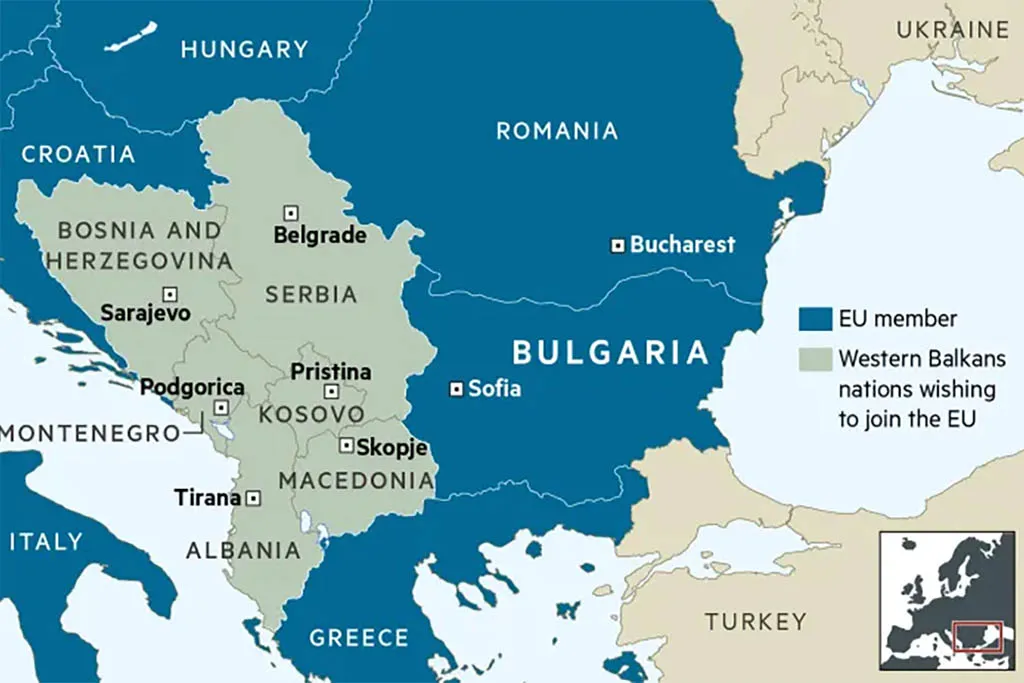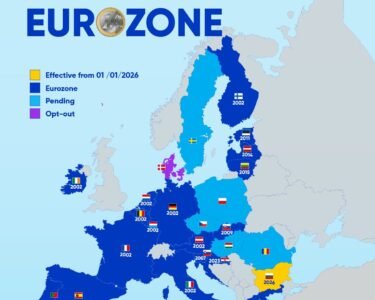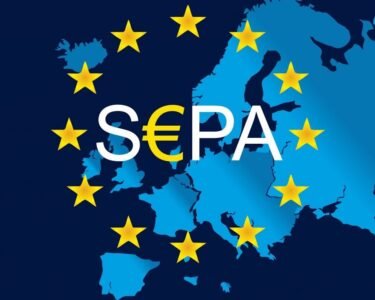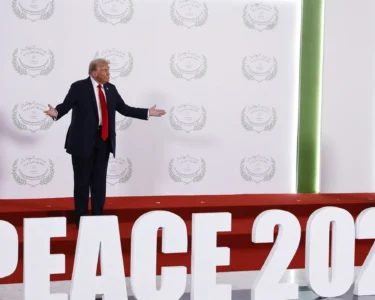Interview with Gino Lanzara
For the past 100 years, the Balkans have always been seen as the soft underbelly of Europe and an area of great instability. The spark of World War I was ignited here and here, in the heart of Europe, the Cold War hit hardest. Can it be said that today the Balkan area in general has stabilized although there are still risk factors given the fact, geographically and anthropologically, there are such peculiarities that lead to problems related to the many different peoples, interests and cultures?
Geographically, the Balkans identify an area that has often been called geopolitically schizophrenic, because it lives immersed in a changing history.
As you rightly said, the Balkans are steeped in history and remain in the imagination that soft part we were just talking about. A little over 100 years ago the Austrians understood this and that is why they tried to consolidate the region until the shooting of Gavrilo Princip, which put an end to what could have been a political solution by opening the door to war.
It is a culturally and religiously important area, it is composite and interesting starting with Sarajevo and its Mosque with the strong Kurdish, not Ottoman, reminiscences referable to Salah el Dinh.
Right now we could even extend the concept a bit and take the Balkans out of the definition of Western and into the broader one of enlarged, as a result of the invasion of Ukraine, which has led to a kind of compression of what could have been the Eastern Balkans with the joining of the interior with the Black Sea to the Adriatic, with all the possible criticalities and vulnerabilities. The situation becomes even more interesting and fluid if it takes into account the wedge formed by the countries that make up the Trimarium, which starts from the Baltic, crosses the Balkans and reaches the Mediterranean. Here it is that from a political and economic point of view the Western Balkans, especially for us, become enlarged Balkans, more involving more important and often also more difficult to understand, since then they are largely identified with the former Yugoslavia and Albania,
How important is Albania in the perspective of the enlarged Balkans?
Albania is a country in its own right with an interesting history that currently should be of special importance just for us. Here, I add the conditional because the country that is struggling to fit in right now in the Western perspective is our own while there are others, such as Germany or even Switzerland, that are imposing choices and production lines that see us penalized. The problem is not Swiss, not even German; the problem, it is Italian.
Despite the fact that geographically Italy's western location is potentially the most favorable, Rome has proven to lack a consistent foreign, economic and strategic policy capable of imposing productive leadership.
Probably our problem lies in understanding the difference between geographical proximity, possibility and actual power projection with the ability to exercise lasting policy.
Geographical proximity should make it easier for us, but it should be conceptually parallel to the exercise of foreign policy, somewhat like the Germans do from the north who manage to insert themselves into dynamics that, not even 100 years ago, were geopolitically animated by Austrians, Ottomans, and Russians, while now there are no less than 18 players involved. Difficult to harmonize economics and politics among countries forced to be dynamic
Keep in mind that in this area there is Turkey, which continues to move to gain and maintain a role, following a red thread that links Erdogan's policy with the Balkans.
Erdogan, beyond any personal considerations, is a careful politician; with him, from an analytical and neutral point of view, Turkey wants to regain what was its weight in the Balkans starting with Bosnia, the area of the green wave, the most Islamized one and from where, in the past years, the first radical insurgency movements were revealed. Turkey is not giving in because it has so many interests and is a country that plays well on all tables at the moment. It is no coincidence that Turkey is also playing important command roles in the NATO arena, alternating with other countries including our own, but certainly we should not forget how their pervasiveness is inspired by a concept of strategic depth, which is completely foreign to us.
It is from there that we may begin to have problems that geopolitically connect crosswise with our foreign policy difficulties in relation to successive governments. Right now we can imagine Turkish vector thrusts from traditional areas to the east and those, again Turkish, coming at us from the south, from Libya, once our exclusive zone of influence.
Many of the countries in the enlarged Balkans are part of NATO, which from a defensive military alliance could exercise a political role as well?
NATO undoubtedly plays a decisive role; in addition to the more strictly military and defensive aspect, it is important to remember the politico-diplomatic component that exercises a strategy aimed at regional stabilization. As an Italian, I would like to recall the work of General Ristuccia, who between 2022 and 2023, at the command of Kfor, was able to operate with sagacity the preventing dangerous situations from degenerating. NATO is an actor on a par with the EU and the Americans, interposing itself between the capitals of the most important area countries.
The political entities in Belgrade and Pristina are relevant; what is important now is for us Italians to figure out how to interpose ourselves and operate, because while it is true that we have a proactive economy, and while it is proven that we also have a defense that has demonstrated that it can work in the field, it is also true that we always need a political push that over time manages to be equally proactive and manages to support all aspects. Be careful because the economic part is becoming worrisome; there are so many countries in that area, from Slovenia on down, that are seeing us struggling; we are losing bite, exports are suffering.
Albania, although a small country, has an important geographical position . Can it become a stable and reliable reference point for the rest of the Alliance as well?
Let us not be misled by the physical size of Albania, for it is a country that has so much potential in the making along with difficulties and critical issues common to so many others in the area and beyond, aspects that need to be considered for the purpose of more proactive integration and with a view to the future.
At this time, political leadership is also not to be underestimated; Prime Minister Edi Rama is someone who has proven himself to be flexible, capable, and able to relate well and productively with key regional leaderships, such as Belgrade, not to mention that he has managed to temper periodic Kosovar thrusts; in short, a politician who is able to handle potentially difficult situations also because they arose politically in relatively recent times but retain aspects and nationalist impulses of yesteryear from no less than a few decades or more ago, which Europe has already experienced and overcome. Albania, like the whole region for that matter, came to it later; it therefore becomes a bit more difficult in a more advanced situation to reconcile the impulses of the past. But I repeat, for us Albania is important, because it has a more than appreciable position and also because in the NATO framework it can become a country that can have a say by relating well with both Greece and Turkey. I read a short while ago that Albania is probably the country that most and best could balance anthropologically and socially the return of Ankara, so it is certainly an entity to be taken into careful consideration. After all, there is to be considered that the presence of Albanian oriundians in Turkey is substantial with about 10 million individuals and that, I believe, 60% of Turkish political and institutional leaders are of Albanian origin. In short, Albania combines well geographical location and propensity to carry out productive policies for our country as well; of course, it has to be seen whether all of Rama's programs are developable, but there is no doubt that he is a capable person. Despite the fact that he may appear inelegant, I don't think we would do badly to remain on the crest of the wave given the favor that Italy still enjoys. Given Italy's good reputation, it would not come back so inconclusive to consider the synergies between politics, economics, defense and power projection that, at any time and under any government, can only bring benefits.
Would speeding up the entry of the 9 countries that are on the waiting list in this area into Europe be a wise move given also the aggressiveness of Russia with the risks of direct or indirect destabilization? How could it happen for example with the Republic of Moldova and other neighboring areas? Should Europe speed up the entry of these countries or comply with its rather lengthy procedures?
Taking into account the various aspects and also given the developments that followed the last elections for the European Parliament I lean toward a more thoughtful time, also because Europe is a basically financial and economic union where the political part is still developing very slowly; the assessment of what concerns the development of foreign policy is cumbersome; for example, the record tells us that Germany on the one hand welcomes the entry and integration of other countries, and on the other fears and opposes them; so this is a country that looks precisely at the Balkan area more carefully, more cautiously, and if on the one hand it seems to pull on the other hand it pushes away.
Right now it is probably Montenegro that has the best chance of being accepted in the most important fora because it is the smallest with a population that does not reach one million; in short, it is the country that all in all offers the possibility of opening a useful path for others as well in a painless and less reckless way. It is clear that political evaluation is important there as well, especially with regard to those countries that propose themselves as antemurals or facilitators of a Russian rapprochement, something that is now certainly difficult to propose, not least because perhaps it is the social base of these countries themselves that have different ideas because they are convinced that rapprochement with the East will only bring further difficulties.
Incidentally, it does not seem that Europe is facilitating the implementation of policies capable of accelerating processes that inevitably leave so many other problematic issues open. Facilitating any other country could perhaps rekindle the resentment of others still and long left in the lurch such as Turkey, which also still does not meet all the requirements, not to mention the economic-financial parameters, which are as binding as ever.
While a hypothetical Russian rapprochement seems as unlikely as ever, given also the Kremlin's aggressive policy, China comes forward with its own more plush style, with which it could perhaps try to put its foot down in this area on economic grounds and by establishing good political relations as it has done with African countries.
Here obviously the context is different, but certainly it is not forbidden to think of an approach with its usual Beijing soft power.
We for one are well aware of this, since in recent times China had targeted our Peninsula and our ports decisively; it is no mystery that China identifies those most likely, or most vulnerable, to a certain type of policy that on the one hand would seem to help and on the other hand then requires complete willingness to facilitate trade expansion.
All this although China is going through troubled economic times, and in light of the fact that the rapprochement with Russia is effectively preluding China's replacement of the old Russian actor, exhausted by the Ukrainian war. Let us ask ourselves another rhetorical question; if China is a country that can become, if it is not already, a problem in European terms, is it worth accelerating to ensure that countries potentially favorable to the old continent remain in the European orbit, or run the risk of leaving them at the mercy of the Chinese trap? This is where the growth of real foreign policy capacity in the European sphere is still lacking.





